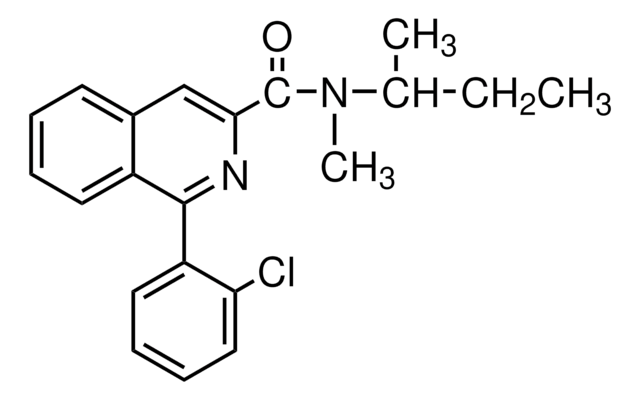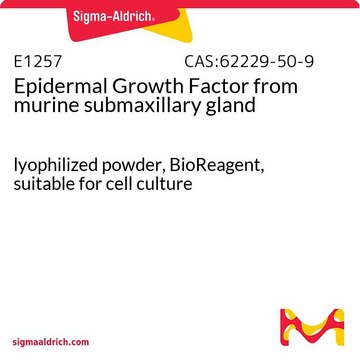E7510
Earle′s Balanced Salt Solution 10x
Without sodium bicarbonate, 10 ×, liquid, sterile-filtered, suitable for cell culture
Sinonimo/i:
EBSS
Autenticatiper visualizzare i prezzi riservati alla tua organizzazione & contrattuali
About This Item
Prodotti consigliati
Sterilità
sterile-filtered
Stato
liquid
Concentrazione
10 ×
tecniche
cell culture | mammalian: suitable
Impurezze
endotoxin, tested
Componenti
glucose: 10.0 g/L
NaHCO3: no
phenol red: 0.11 g/L
Condizioni di spedizione
ambient
Cerchi prodotti simili? Visita Guida al confronto tra prodotti
Descrizione generale
Earle′s Balanced Salt Solution 10x is a saline solution with physiological pH. It is useful in inducing autophagy and promotes Bacillus Calmette-Guérin (BCG)-induced dendritic cells (DCs) maturation.
Applicazioni
Earle′s Balanced Salt Solution 10x has been used:
- as an additive to the nutritive medium sheep nematode Trichostrongylus colubriformis eggs
- in the swim-up method to prepare human sperm sample
- in the steady-state medium to culture bovine primary mammary epithelial cells
Caratteristiche e vantaggi
- Serves as an irrigating, transporting and diluting fluid while maintaining intra- and extracellular osmotic balance.
- Provides cells with water and certain bulk inorganic ions essential for normal cell metabolism.
- When combined with a carbohydrate, such as glucose, provides the principal energy source for cell metabolism.
- Provides a buffering system to maintain the medium within the physiological pH range (7.2-7.6).
Ricostituzione
Supplement with 2.2 g/L sodium bicarbonate at 1×.
Supplemento
N° Catalogo
Descrizione
Determinazione del prezzo
Codice della classe di stoccaggio
12 - Non Combustible Liquids
Classe di pericolosità dell'acqua (WGK)
WGK 1
Punto d’infiammabilità (°F)
Not applicable
Punto d’infiammabilità (°C)
Not applicable
Scegli una delle versioni più recenti:
Possiedi già questo prodotto?
I documenti relativi ai prodotti acquistati recentemente sono disponibili nell’Archivio dei documenti.
I clienti hanno visto anche
Yanli Ren et al.
Cancer letters, 390, 126-136 (2017-01-22)
Dyregulation of autophagy is implicated in human cancers and the mechanism details remains largely unclear. Herein we report the regulatory role of miR-638 in autophagy of esophageal squamous cell carcinoma (ESCC) and breast cancer cells. We found that miR-638 overexpression
Luchao Li et al.
Cell death & disease, 12(2), 220-220 (2021-02-28)
Receptor tyrosine kinase (RTK) inhibitors, such as sunitinib and sorafenib, remain the first-line drugs for the treatment of mRCC. Acquired drug resistance and metastasis are the main causes of treatment failure. However, in the case of metastasis Renal Cell Cancer
Zhenlu Li et al.
Cell death & disease, 9(5), 483-483 (2018-05-01)
Autophagy is an essential cytoprotective response against pathologic stresses that selectively degrades damaged cellular components. Impaired autophagy contributes to organ injury in multiple diseases, including ischemia/reperfusion (I/R), but the exact mechanism by which impaired autophagy is regulated remains unclear. Several
Yizhe Sun et al.
Cell death & disease, 8(8), e3031-e3031 (2017-10-20)
Autophagy is a highly inducible system of intracellular degradation that occurs in lysosomes or vacuoles. Transmembrane 74 (TMEM74) has been shown to induce autophagy. However, the mechanism by which TMEM74 stimulates autophagy and the impacts of TMEM74-induced autophagy on tumor
Identification of natural products with neuronal and metabolic benefits through autophagy induction.
Yuying Fan et al.
Autophagy, 13(1), 41-56 (2016-10-30)
Autophagy is a housekeeping lysosomal degradation pathway important for cellular survival, homeostasis and function. Various disease models have shown that upregulation of autophagy may be beneficial to combat disease pathogenesis. However, despite several recently reported small-molecule screens for synthetic autophagy
Il team dei nostri ricercatori vanta grande esperienza in tutte le aree della ricerca quali Life Science, scienza dei materiali, sintesi chimica, cromatografia, discipline analitiche, ecc..
Contatta l'Assistenza Tecnica.






